Plastic Collective Case Study: Sustainability Strategies and Issues
VerifiedAdded on 2023/03/30
|11
|2038
|342
Report
AI Summary
This report provides a comprehensive analysis of Plastic Collective, an Australian startup focused on innovative and sustainable waste management solutions. The assignment explores the company's background, its significance in the context of environmental sustainability and its contribution to the Australian economy. The report delves into Plastic Collective's sustainability-related strategies, identifying key issues such as expensive machinery, workforce shortages, and funding challenges. It analyzes the roles of planning, organizing, leading, and controlling within the organization, offering recommendations for improvement, including enhanced funding, leadership structure, and community stakeholder engagement. The report concludes by emphasizing the importance of addressing these issues to enhance the company's operational efficiency and its contribution to reducing plastic waste and promoting environmental conservation.
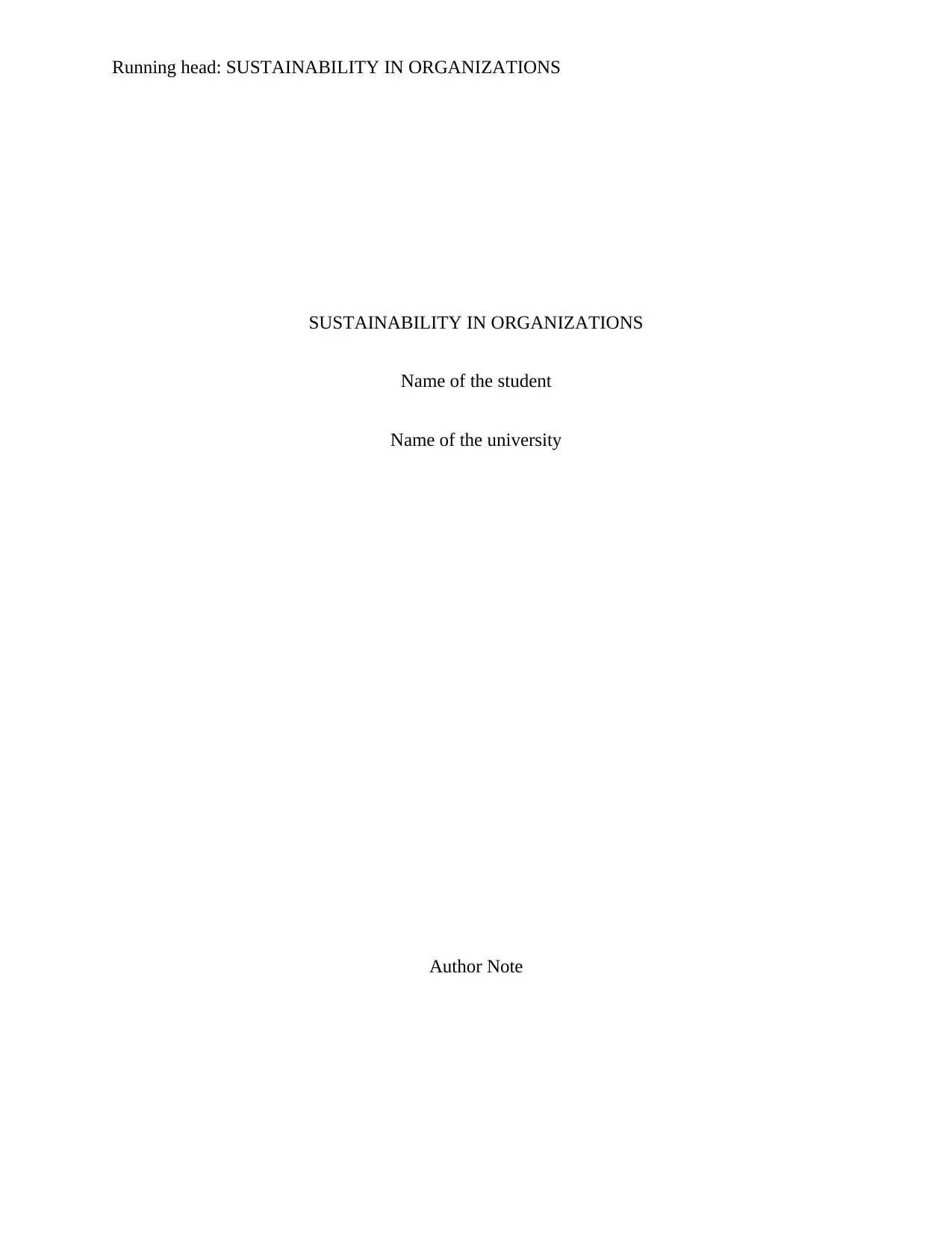
Running head: SUSTAINABILITY IN ORGANIZATIONS
SUSTAINABILITY IN ORGANIZATIONS
Name of the student
Name of the university
Author Note
SUSTAINABILITY IN ORGANIZATIONS
Name of the student
Name of the university
Author Note
Paraphrase This Document
Need a fresh take? Get an instant paraphrase of this document with our AI Paraphraser
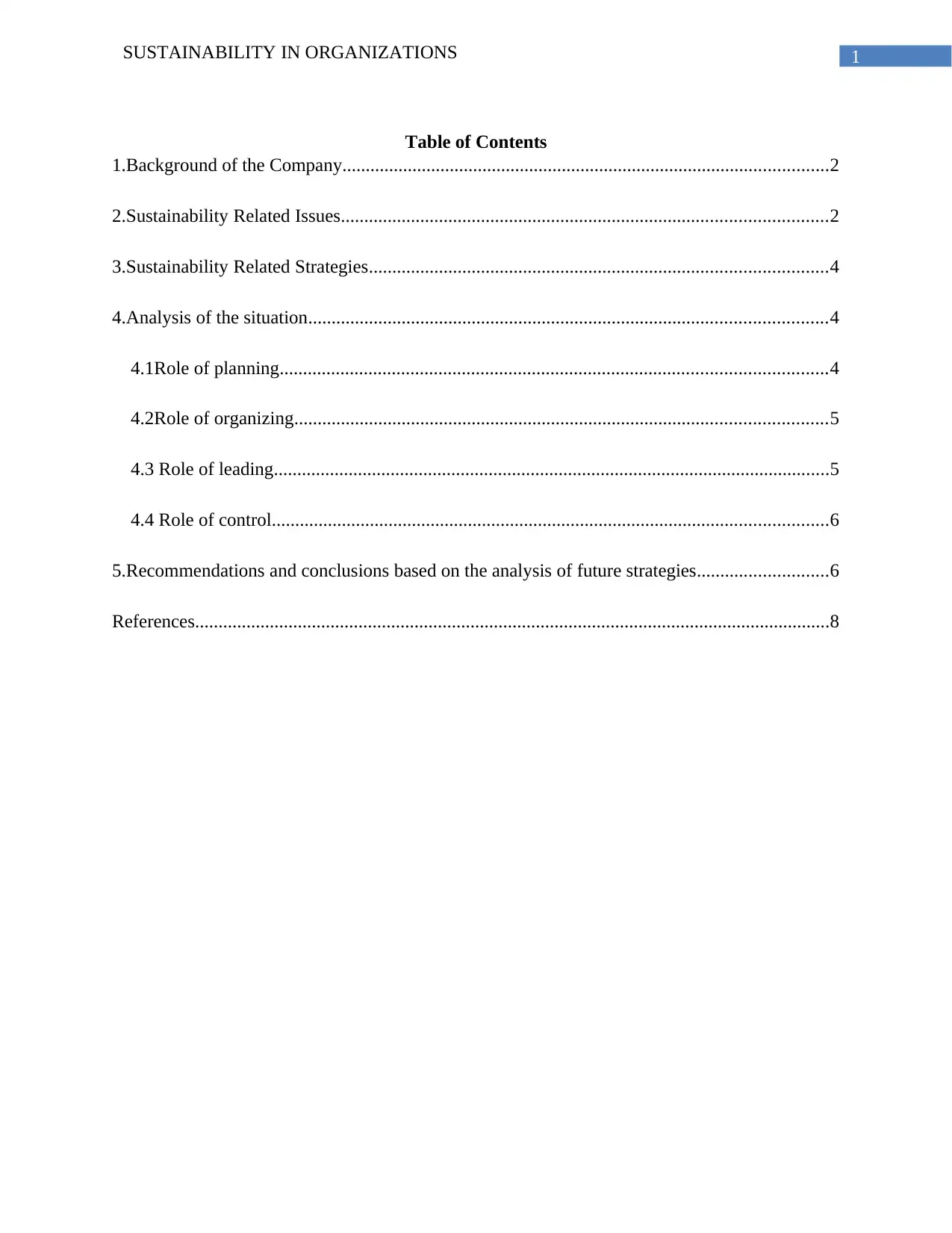
1SUSTAINABILITY IN ORGANIZATIONS
Table of Contents
1.Background of the Company........................................................................................................2
2.Sustainability Related Issues........................................................................................................2
3.Sustainability Related Strategies..................................................................................................4
4.Analysis of the situation...............................................................................................................4
4.1Role of planning.....................................................................................................................4
4.2Role of organizing..................................................................................................................5
4.3 Role of leading.......................................................................................................................5
4.4 Role of control.......................................................................................................................6
5.Recommendations and conclusions based on the analysis of future strategies............................6
References........................................................................................................................................8
Table of Contents
1.Background of the Company........................................................................................................2
2.Sustainability Related Issues........................................................................................................2
3.Sustainability Related Strategies..................................................................................................4
4.Analysis of the situation...............................................................................................................4
4.1Role of planning.....................................................................................................................4
4.2Role of organizing..................................................................................................................5
4.3 Role of leading.......................................................................................................................5
4.4 Role of control.......................................................................................................................6
5.Recommendations and conclusions based on the analysis of future strategies............................6
References........................................................................................................................................8
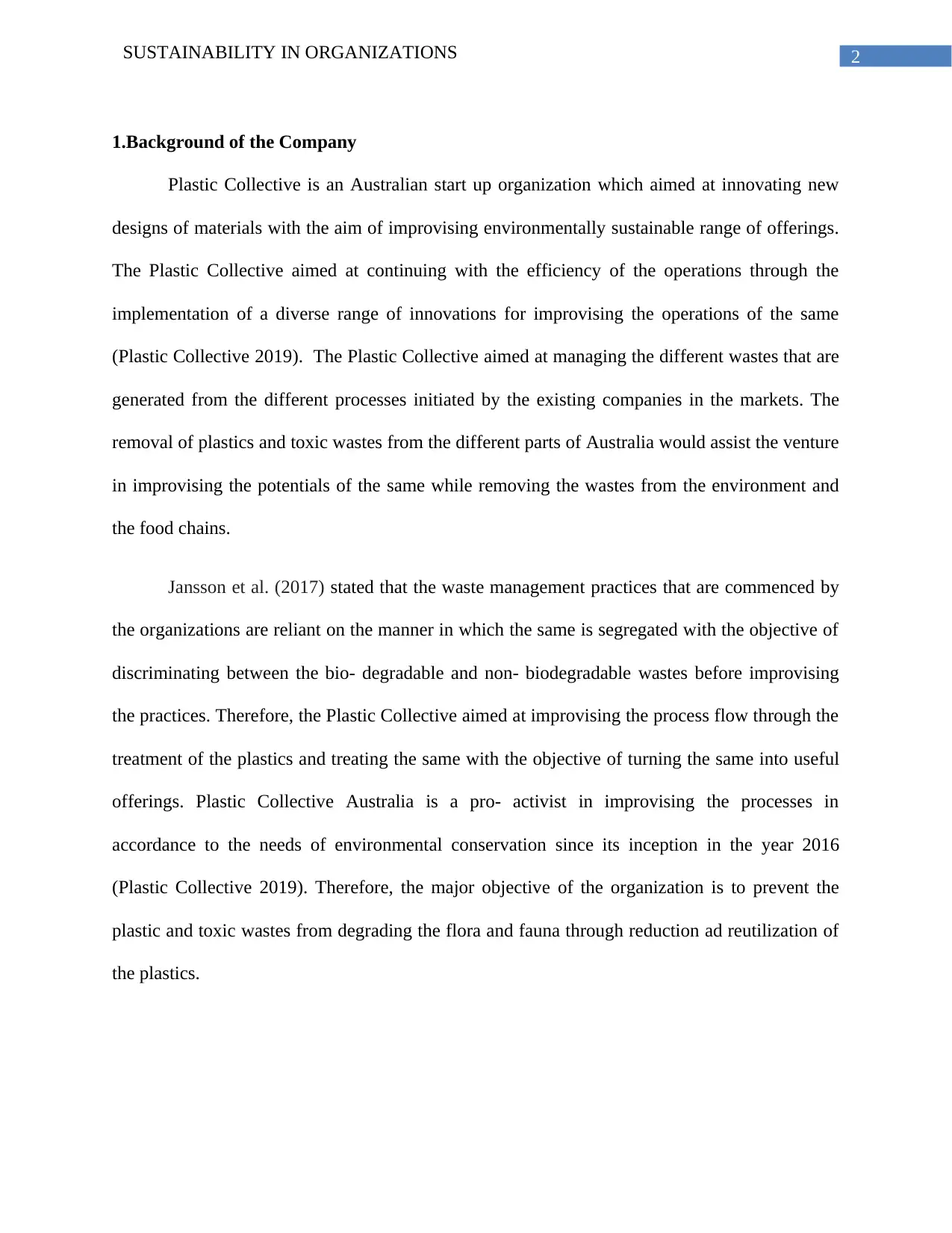
2SUSTAINABILITY IN ORGANIZATIONS
1.Background of the Company
Plastic Collective is an Australian start up organization which aimed at innovating new
designs of materials with the aim of improvising environmentally sustainable range of offerings.
The Plastic Collective aimed at continuing with the efficiency of the operations through the
implementation of a diverse range of innovations for improvising the operations of the same
(Plastic Collective 2019). The Plastic Collective aimed at managing the different wastes that are
generated from the different processes initiated by the existing companies in the markets. The
removal of plastics and toxic wastes from the different parts of Australia would assist the venture
in improvising the potentials of the same while removing the wastes from the environment and
the food chains.
Jansson et al. (2017) stated that the waste management practices that are commenced by
the organizations are reliant on the manner in which the same is segregated with the objective of
discriminating between the bio- degradable and non- biodegradable wastes before improvising
the practices. Therefore, the Plastic Collective aimed at improvising the process flow through the
treatment of the plastics and treating the same with the objective of turning the same into useful
offerings. Plastic Collective Australia is a pro- activist in improvising the processes in
accordance to the needs of environmental conservation since its inception in the year 2016
(Plastic Collective 2019). Therefore, the major objective of the organization is to prevent the
plastic and toxic wastes from degrading the flora and fauna through reduction ad reutilization of
the plastics.
1.Background of the Company
Plastic Collective is an Australian start up organization which aimed at innovating new
designs of materials with the aim of improvising environmentally sustainable range of offerings.
The Plastic Collective aimed at continuing with the efficiency of the operations through the
implementation of a diverse range of innovations for improvising the operations of the same
(Plastic Collective 2019). The Plastic Collective aimed at managing the different wastes that are
generated from the different processes initiated by the existing companies in the markets. The
removal of plastics and toxic wastes from the different parts of Australia would assist the venture
in improvising the potentials of the same while removing the wastes from the environment and
the food chains.
Jansson et al. (2017) stated that the waste management practices that are commenced by
the organizations are reliant on the manner in which the same is segregated with the objective of
discriminating between the bio- degradable and non- biodegradable wastes before improvising
the practices. Therefore, the Plastic Collective aimed at improvising the process flow through the
treatment of the plastics and treating the same with the objective of turning the same into useful
offerings. Plastic Collective Australia is a pro- activist in improvising the processes in
accordance to the needs of environmental conservation since its inception in the year 2016
(Plastic Collective 2019). Therefore, the major objective of the organization is to prevent the
plastic and toxic wastes from degrading the flora and fauna through reduction ad reutilization of
the plastics.
⊘ This is a preview!⊘
Do you want full access?
Subscribe today to unlock all pages.

Trusted by 1+ million students worldwide
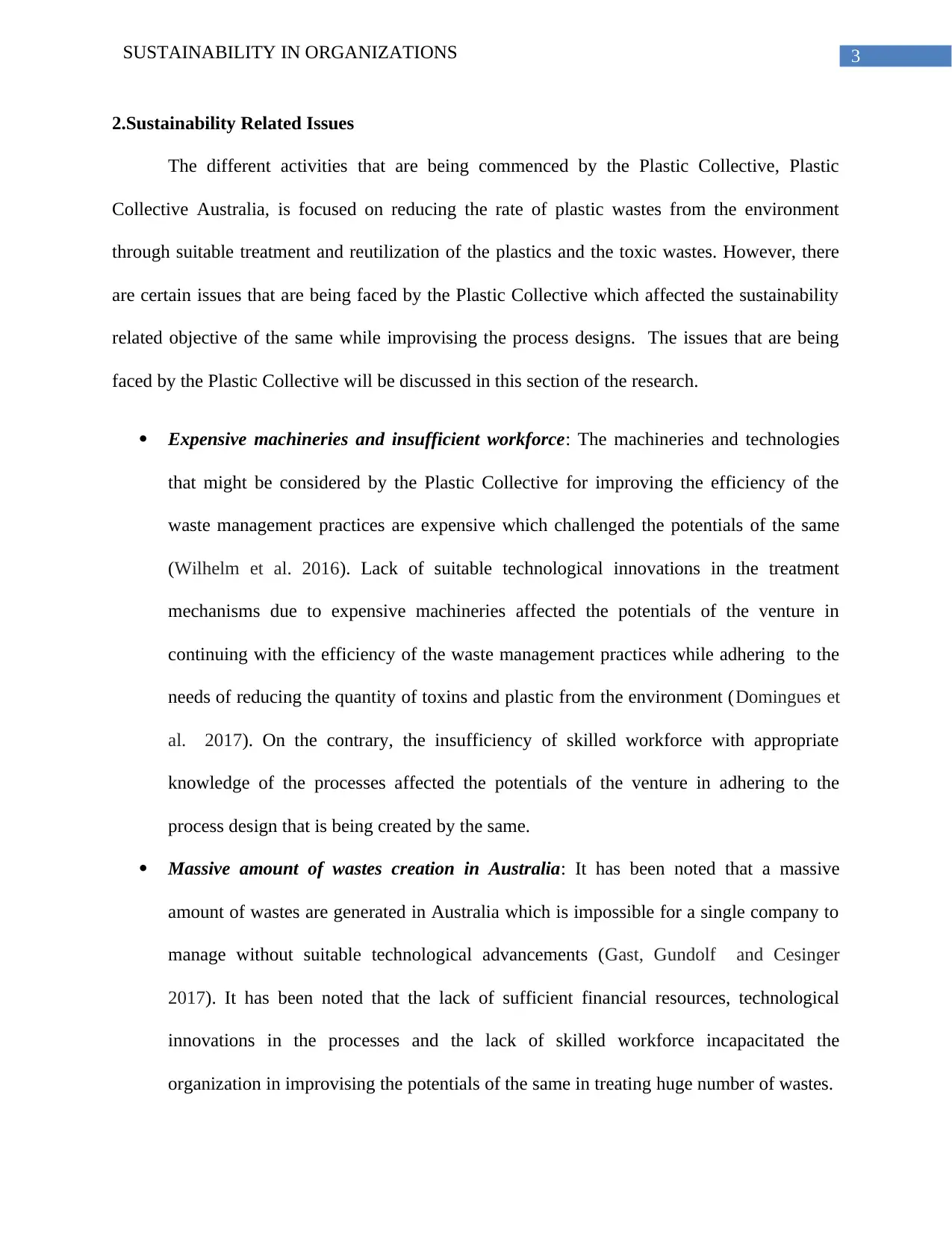
3SUSTAINABILITY IN ORGANIZATIONS
2.Sustainability Related Issues
The different activities that are being commenced by the Plastic Collective, Plastic
Collective Australia, is focused on reducing the rate of plastic wastes from the environment
through suitable treatment and reutilization of the plastics and the toxic wastes. However, there
are certain issues that are being faced by the Plastic Collective which affected the sustainability
related objective of the same while improvising the process designs. The issues that are being
faced by the Plastic Collective will be discussed in this section of the research.
Expensive machineries and insufficient workforce: The machineries and technologies
that might be considered by the Plastic Collective for improving the efficiency of the
waste management practices are expensive which challenged the potentials of the same
(Wilhelm et al. 2016). Lack of suitable technological innovations in the treatment
mechanisms due to expensive machineries affected the potentials of the venture in
continuing with the efficiency of the waste management practices while adhering to the
needs of reducing the quantity of toxins and plastic from the environment (Domingues et
al. 2017). On the contrary, the insufficiency of skilled workforce with appropriate
knowledge of the processes affected the potentials of the venture in adhering to the
process design that is being created by the same.
Massive amount of wastes creation in Australia: It has been noted that a massive
amount of wastes are generated in Australia which is impossible for a single company to
manage without suitable technological advancements (Gast, Gundolf and Cesinger
2017). It has been noted that the lack of sufficient financial resources, technological
innovations in the processes and the lack of skilled workforce incapacitated the
organization in improvising the potentials of the same in treating huge number of wastes.
2.Sustainability Related Issues
The different activities that are being commenced by the Plastic Collective, Plastic
Collective Australia, is focused on reducing the rate of plastic wastes from the environment
through suitable treatment and reutilization of the plastics and the toxic wastes. However, there
are certain issues that are being faced by the Plastic Collective which affected the sustainability
related objective of the same while improvising the process designs. The issues that are being
faced by the Plastic Collective will be discussed in this section of the research.
Expensive machineries and insufficient workforce: The machineries and technologies
that might be considered by the Plastic Collective for improving the efficiency of the
waste management practices are expensive which challenged the potentials of the same
(Wilhelm et al. 2016). Lack of suitable technological innovations in the treatment
mechanisms due to expensive machineries affected the potentials of the venture in
continuing with the efficiency of the waste management practices while adhering to the
needs of reducing the quantity of toxins and plastic from the environment (Domingues et
al. 2017). On the contrary, the insufficiency of skilled workforce with appropriate
knowledge of the processes affected the potentials of the venture in adhering to the
process design that is being created by the same.
Massive amount of wastes creation in Australia: It has been noted that a massive
amount of wastes are generated in Australia which is impossible for a single company to
manage without suitable technological advancements (Gast, Gundolf and Cesinger
2017). It has been noted that the lack of sufficient financial resources, technological
innovations in the processes and the lack of skilled workforce incapacitated the
organization in improvising the potentials of the same in treating huge number of wastes.
Paraphrase This Document
Need a fresh take? Get an instant paraphrase of this document with our AI Paraphraser
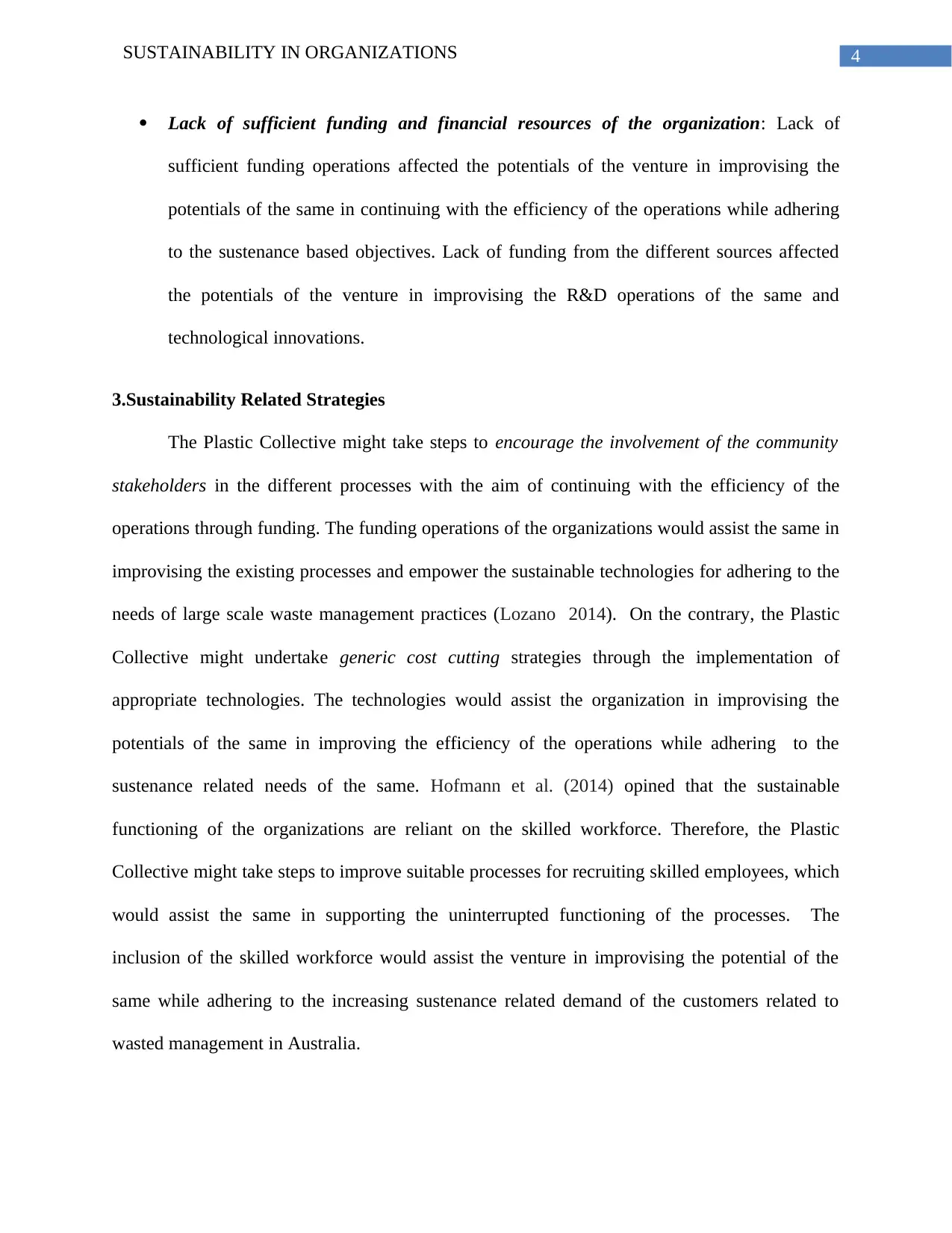
4SUSTAINABILITY IN ORGANIZATIONS
Lack of sufficient funding and financial resources of the organization: Lack of
sufficient funding operations affected the potentials of the venture in improvising the
potentials of the same in continuing with the efficiency of the operations while adhering
to the sustenance based objectives. Lack of funding from the different sources affected
the potentials of the venture in improvising the R&D operations of the same and
technological innovations.
3.Sustainability Related Strategies
The Plastic Collective might take steps to encourage the involvement of the community
stakeholders in the different processes with the aim of continuing with the efficiency of the
operations through funding. The funding operations of the organizations would assist the same in
improvising the existing processes and empower the sustainable technologies for adhering to the
needs of large scale waste management practices (Lozano 2014). On the contrary, the Plastic
Collective might undertake generic cost cutting strategies through the implementation of
appropriate technologies. The technologies would assist the organization in improvising the
potentials of the same in improving the efficiency of the operations while adhering to the
sustenance related needs of the same. Hofmann et al. (2014) opined that the sustainable
functioning of the organizations are reliant on the skilled workforce. Therefore, the Plastic
Collective might take steps to improve suitable processes for recruiting skilled employees, which
would assist the same in supporting the uninterrupted functioning of the processes. The
inclusion of the skilled workforce would assist the venture in improvising the potential of the
same while adhering to the increasing sustenance related demand of the customers related to
wasted management in Australia.
Lack of sufficient funding and financial resources of the organization: Lack of
sufficient funding operations affected the potentials of the venture in improvising the
potentials of the same in continuing with the efficiency of the operations while adhering
to the sustenance based objectives. Lack of funding from the different sources affected
the potentials of the venture in improvising the R&D operations of the same and
technological innovations.
3.Sustainability Related Strategies
The Plastic Collective might take steps to encourage the involvement of the community
stakeholders in the different processes with the aim of continuing with the efficiency of the
operations through funding. The funding operations of the organizations would assist the same in
improvising the existing processes and empower the sustainable technologies for adhering to the
needs of large scale waste management practices (Lozano 2014). On the contrary, the Plastic
Collective might undertake generic cost cutting strategies through the implementation of
appropriate technologies. The technologies would assist the organization in improvising the
potentials of the same in improving the efficiency of the operations while adhering to the
sustenance related needs of the same. Hofmann et al. (2014) opined that the sustainable
functioning of the organizations are reliant on the skilled workforce. Therefore, the Plastic
Collective might take steps to improve suitable processes for recruiting skilled employees, which
would assist the same in supporting the uninterrupted functioning of the processes. The
inclusion of the skilled workforce would assist the venture in improvising the potential of the
same while adhering to the increasing sustenance related demand of the customers related to
wasted management in Australia.
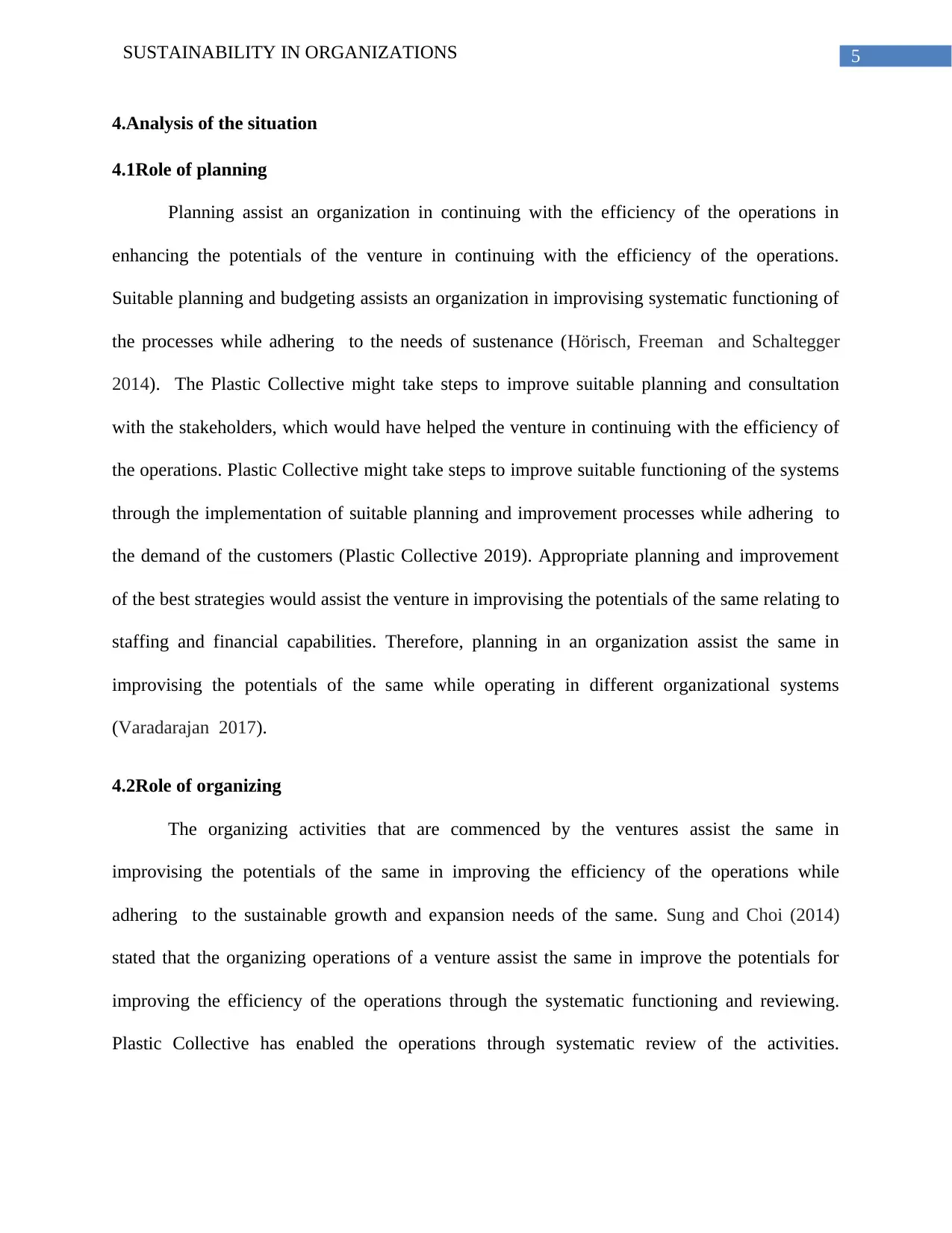
5SUSTAINABILITY IN ORGANIZATIONS
4.Analysis of the situation
4.1Role of planning
Planning assist an organization in continuing with the efficiency of the operations in
enhancing the potentials of the venture in continuing with the efficiency of the operations.
Suitable planning and budgeting assists an organization in improvising systematic functioning of
the processes while adhering to the needs of sustenance (Hörisch, Freeman and Schaltegger
2014). The Plastic Collective might take steps to improve suitable planning and consultation
with the stakeholders, which would have helped the venture in continuing with the efficiency of
the operations. Plastic Collective might take steps to improve suitable functioning of the systems
through the implementation of suitable planning and improvement processes while adhering to
the demand of the customers (Plastic Collective 2019). Appropriate planning and improvement
of the best strategies would assist the venture in improvising the potentials of the same relating to
staffing and financial capabilities. Therefore, planning in an organization assist the same in
improvising the potentials of the same while operating in different organizational systems
(Varadarajan 2017).
4.2Role of organizing
The organizing activities that are commenced by the ventures assist the same in
improvising the potentials of the same in improving the efficiency of the operations while
adhering to the sustainable growth and expansion needs of the same. Sung and Choi (2014)
stated that the organizing operations of a venture assist the same in improve the potentials for
improving the efficiency of the operations through the systematic functioning and reviewing.
Plastic Collective has enabled the operations through systematic review of the activities.
4.Analysis of the situation
4.1Role of planning
Planning assist an organization in continuing with the efficiency of the operations in
enhancing the potentials of the venture in continuing with the efficiency of the operations.
Suitable planning and budgeting assists an organization in improvising systematic functioning of
the processes while adhering to the needs of sustenance (Hörisch, Freeman and Schaltegger
2014). The Plastic Collective might take steps to improve suitable planning and consultation
with the stakeholders, which would have helped the venture in continuing with the efficiency of
the operations. Plastic Collective might take steps to improve suitable functioning of the systems
through the implementation of suitable planning and improvement processes while adhering to
the demand of the customers (Plastic Collective 2019). Appropriate planning and improvement
of the best strategies would assist the venture in improvising the potentials of the same relating to
staffing and financial capabilities. Therefore, planning in an organization assist the same in
improvising the potentials of the same while operating in different organizational systems
(Varadarajan 2017).
4.2Role of organizing
The organizing activities that are commenced by the ventures assist the same in
improvising the potentials of the same in improving the efficiency of the operations while
adhering to the sustainable growth and expansion needs of the same. Sung and Choi (2014)
stated that the organizing operations of a venture assist the same in improve the potentials for
improving the efficiency of the operations through the systematic functioning and reviewing.
Plastic Collective has enabled the operations through systematic review of the activities.
⊘ This is a preview!⊘
Do you want full access?
Subscribe today to unlock all pages.

Trusted by 1+ million students worldwide
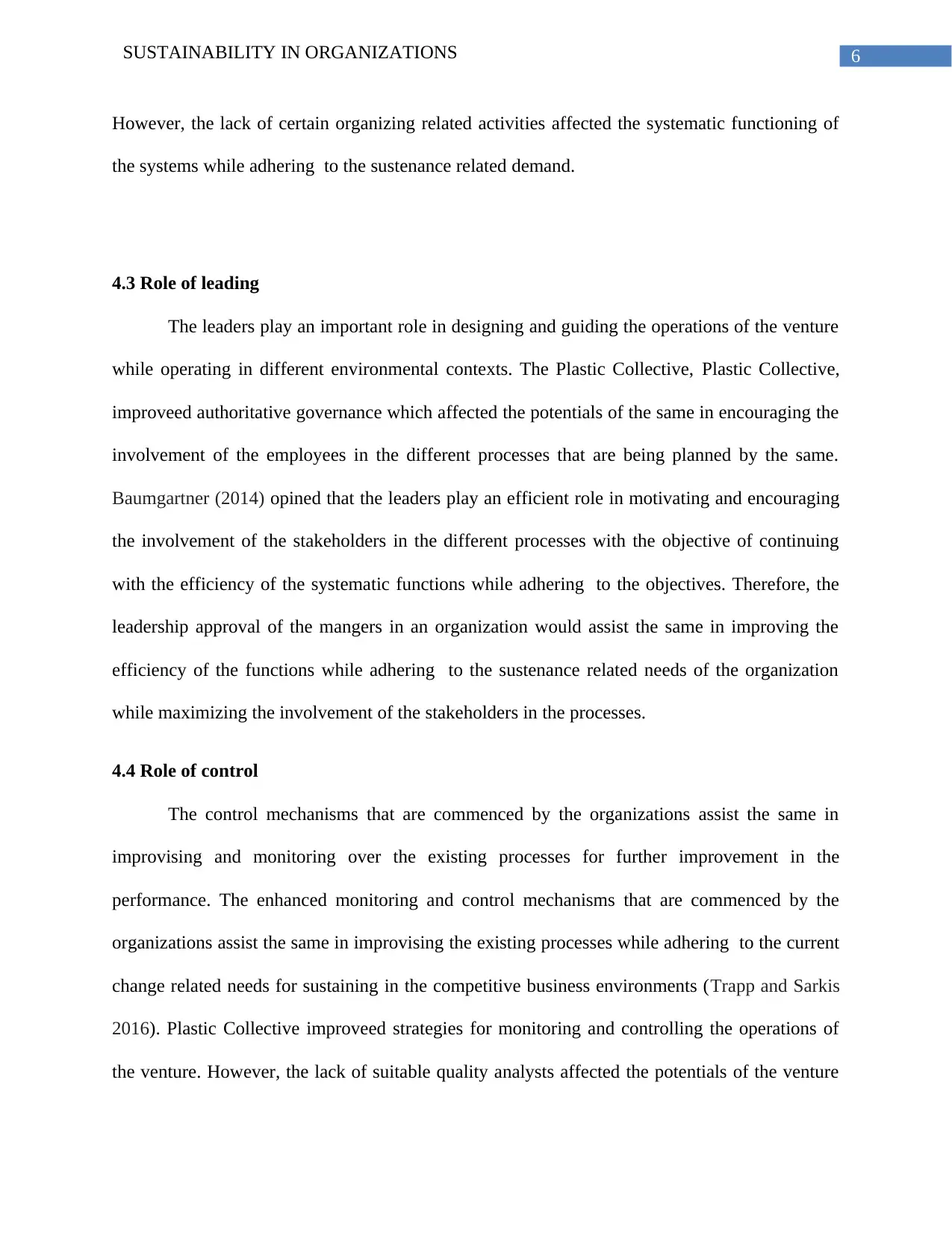
6SUSTAINABILITY IN ORGANIZATIONS
However, the lack of certain organizing related activities affected the systematic functioning of
the systems while adhering to the sustenance related demand.
4.3 Role of leading
The leaders play an important role in designing and guiding the operations of the venture
while operating in different environmental contexts. The Plastic Collective, Plastic Collective,
improveed authoritative governance which affected the potentials of the same in encouraging the
involvement of the employees in the different processes that are being planned by the same.
Baumgartner (2014) opined that the leaders play an efficient role in motivating and encouraging
the involvement of the stakeholders in the different processes with the objective of continuing
with the efficiency of the systematic functions while adhering to the objectives. Therefore, the
leadership approval of the mangers in an organization would assist the same in improving the
efficiency of the functions while adhering to the sustenance related needs of the organization
while maximizing the involvement of the stakeholders in the processes.
4.4 Role of control
The control mechanisms that are commenced by the organizations assist the same in
improvising and monitoring over the existing processes for further improvement in the
performance. The enhanced monitoring and control mechanisms that are commenced by the
organizations assist the same in improvising the existing processes while adhering to the current
change related needs for sustaining in the competitive business environments (Trapp and Sarkis
2016). Plastic Collective improveed strategies for monitoring and controlling the operations of
the venture. However, the lack of suitable quality analysts affected the potentials of the venture
However, the lack of certain organizing related activities affected the systematic functioning of
the systems while adhering to the sustenance related demand.
4.3 Role of leading
The leaders play an important role in designing and guiding the operations of the venture
while operating in different environmental contexts. The Plastic Collective, Plastic Collective,
improveed authoritative governance which affected the potentials of the same in encouraging the
involvement of the employees in the different processes that are being planned by the same.
Baumgartner (2014) opined that the leaders play an efficient role in motivating and encouraging
the involvement of the stakeholders in the different processes with the objective of continuing
with the efficiency of the systematic functions while adhering to the objectives. Therefore, the
leadership approval of the mangers in an organization would assist the same in improving the
efficiency of the functions while adhering to the sustenance related needs of the organization
while maximizing the involvement of the stakeholders in the processes.
4.4 Role of control
The control mechanisms that are commenced by the organizations assist the same in
improvising and monitoring over the existing processes for further improvement in the
performance. The enhanced monitoring and control mechanisms that are commenced by the
organizations assist the same in improvising the existing processes while adhering to the current
change related needs for sustaining in the competitive business environments (Trapp and Sarkis
2016). Plastic Collective improveed strategies for monitoring and controlling the operations of
the venture. However, the lack of suitable quality analysts affected the potentials of the venture
Paraphrase This Document
Need a fresh take? Get an instant paraphrase of this document with our AI Paraphraser
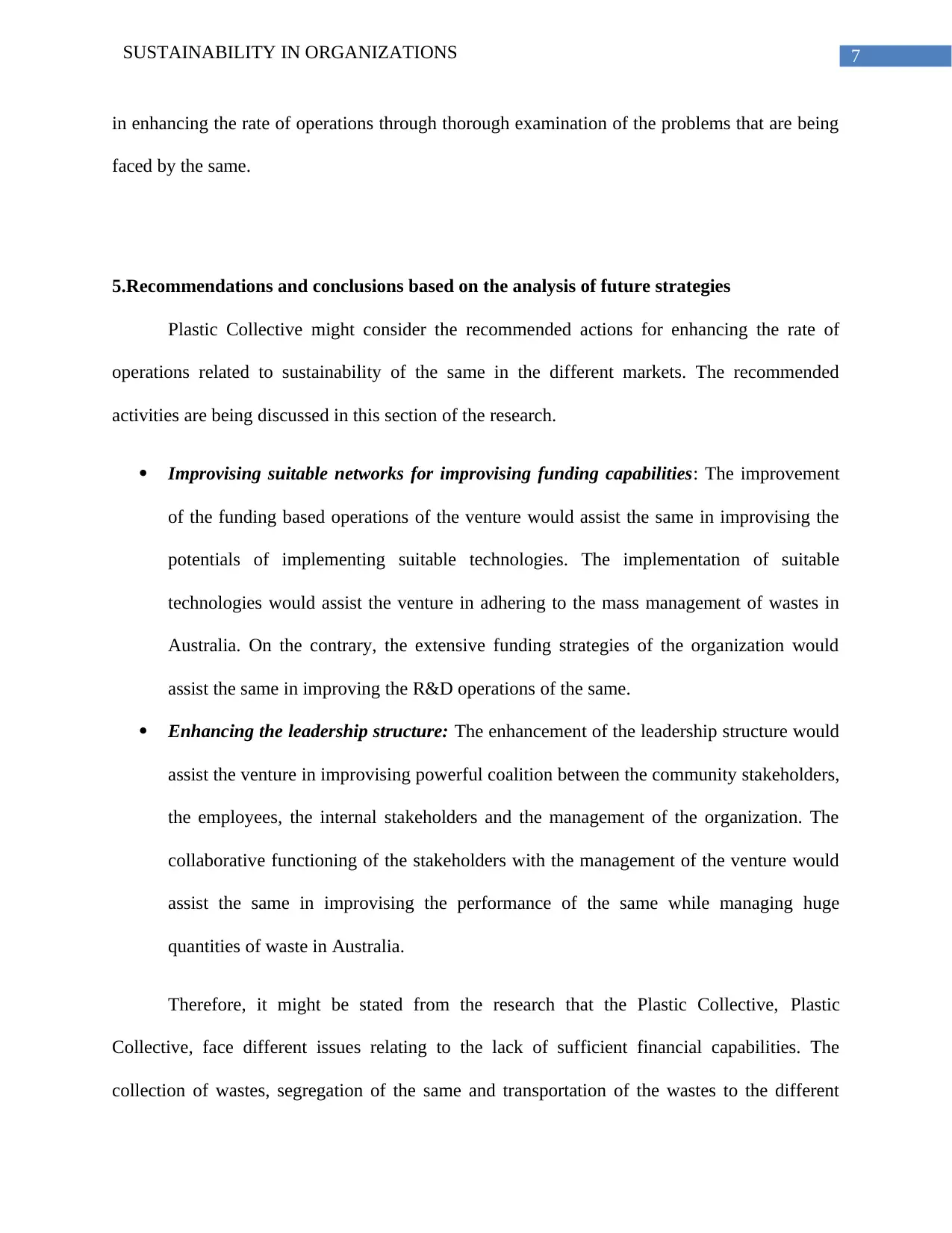
7SUSTAINABILITY IN ORGANIZATIONS
in enhancing the rate of operations through thorough examination of the problems that are being
faced by the same.
5.Recommendations and conclusions based on the analysis of future strategies
Plastic Collective might consider the recommended actions for enhancing the rate of
operations related to sustainability of the same in the different markets. The recommended
activities are being discussed in this section of the research.
Improvising suitable networks for improvising funding capabilities: The improvement
of the funding based operations of the venture would assist the same in improvising the
potentials of implementing suitable technologies. The implementation of suitable
technologies would assist the venture in adhering to the mass management of wastes in
Australia. On the contrary, the extensive funding strategies of the organization would
assist the same in improving the R&D operations of the same.
Enhancing the leadership structure: The enhancement of the leadership structure would
assist the venture in improvising powerful coalition between the community stakeholders,
the employees, the internal stakeholders and the management of the organization. The
collaborative functioning of the stakeholders with the management of the venture would
assist the same in improvising the performance of the same while managing huge
quantities of waste in Australia.
Therefore, it might be stated from the research that the Plastic Collective, Plastic
Collective, face different issues relating to the lack of sufficient financial capabilities. The
collection of wastes, segregation of the same and transportation of the wastes to the different
in enhancing the rate of operations through thorough examination of the problems that are being
faced by the same.
5.Recommendations and conclusions based on the analysis of future strategies
Plastic Collective might consider the recommended actions for enhancing the rate of
operations related to sustainability of the same in the different markets. The recommended
activities are being discussed in this section of the research.
Improvising suitable networks for improvising funding capabilities: The improvement
of the funding based operations of the venture would assist the same in improvising the
potentials of implementing suitable technologies. The implementation of suitable
technologies would assist the venture in adhering to the mass management of wastes in
Australia. On the contrary, the extensive funding strategies of the organization would
assist the same in improving the R&D operations of the same.
Enhancing the leadership structure: The enhancement of the leadership structure would
assist the venture in improvising powerful coalition between the community stakeholders,
the employees, the internal stakeholders and the management of the organization. The
collaborative functioning of the stakeholders with the management of the venture would
assist the same in improvising the performance of the same while managing huge
quantities of waste in Australia.
Therefore, it might be stated from the research that the Plastic Collective, Plastic
Collective, face different issues relating to the lack of sufficient financial capabilities. The
collection of wastes, segregation of the same and transportation of the wastes to the different
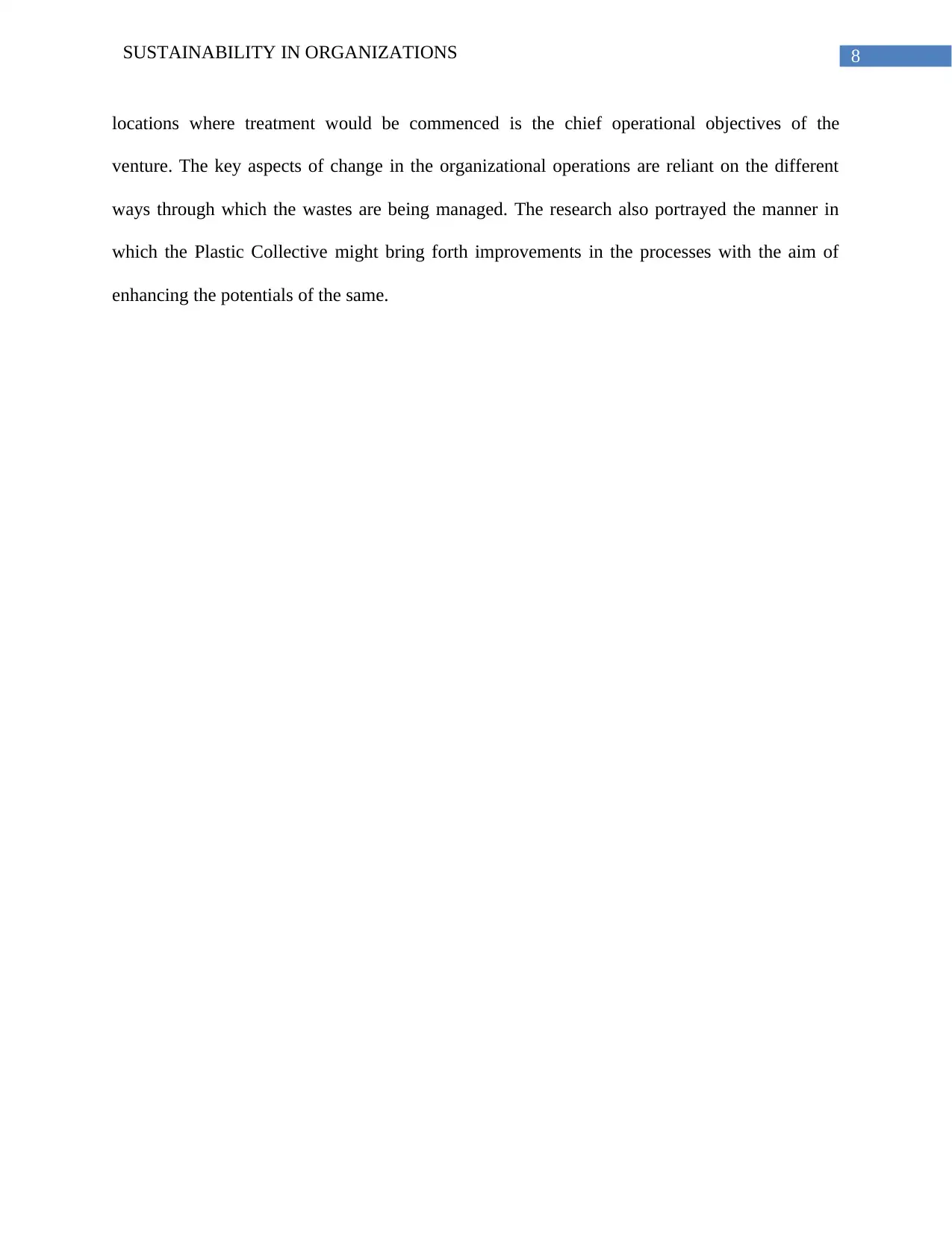
8SUSTAINABILITY IN ORGANIZATIONS
locations where treatment would be commenced is the chief operational objectives of the
venture. The key aspects of change in the organizational operations are reliant on the different
ways through which the wastes are being managed. The research also portrayed the manner in
which the Plastic Collective might bring forth improvements in the processes with the aim of
enhancing the potentials of the same.
locations where treatment would be commenced is the chief operational objectives of the
venture. The key aspects of change in the organizational operations are reliant on the different
ways through which the wastes are being managed. The research also portrayed the manner in
which the Plastic Collective might bring forth improvements in the processes with the aim of
enhancing the potentials of the same.
⊘ This is a preview!⊘
Do you want full access?
Subscribe today to unlock all pages.

Trusted by 1+ million students worldwide
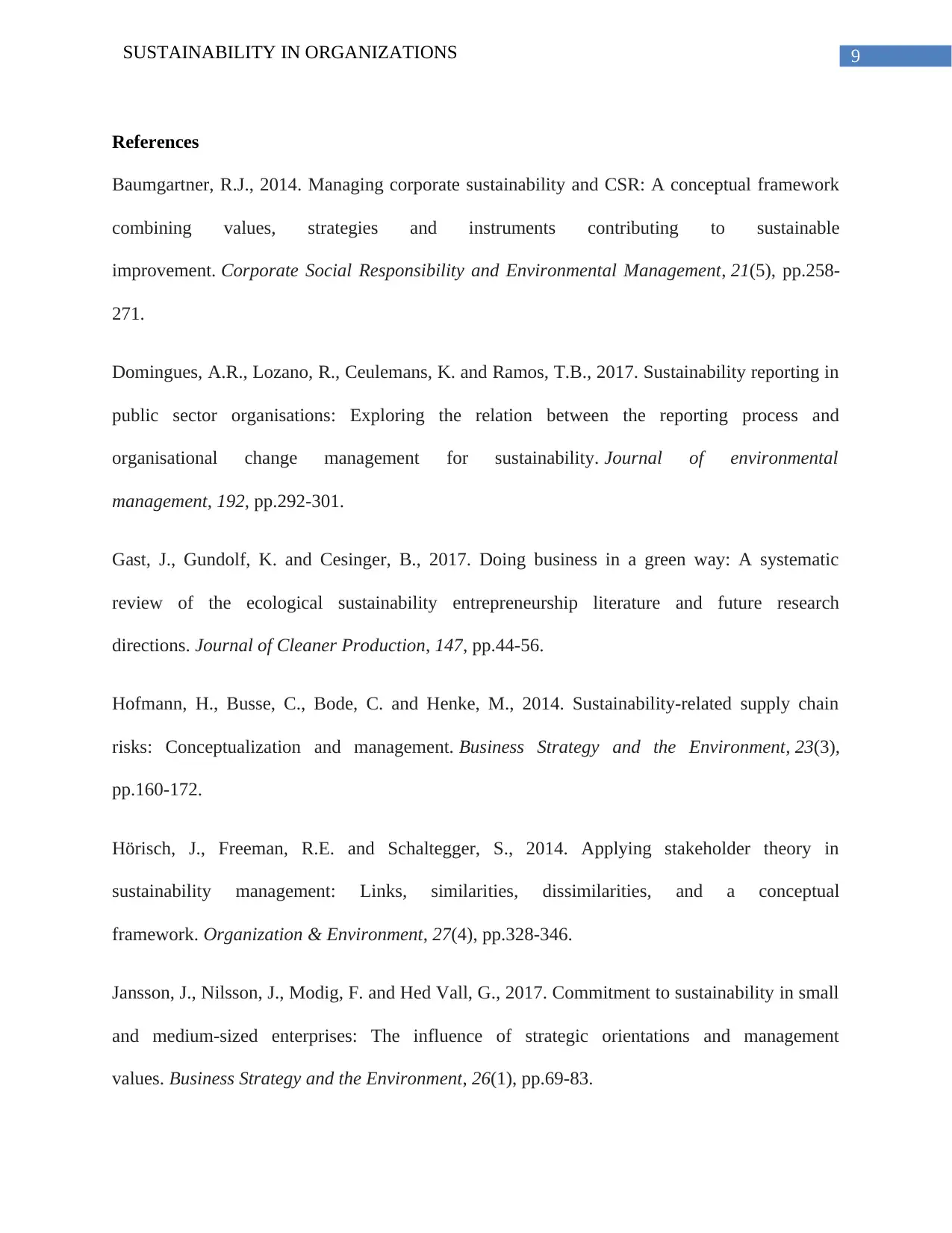
9SUSTAINABILITY IN ORGANIZATIONS
References
Baumgartner, R.J., 2014. Managing corporate sustainability and CSR: A conceptual framework
combining values, strategies and instruments contributing to sustainable
improvement. Corporate Social Responsibility and Environmental Management, 21(5), pp.258-
271.
Domingues, A.R., Lozano, R., Ceulemans, K. and Ramos, T.B., 2017. Sustainability reporting in
public sector organisations: Exploring the relation between the reporting process and
organisational change management for sustainability. Journal of environmental
management, 192, pp.292-301.
Gast, J., Gundolf, K. and Cesinger, B., 2017. Doing business in a green way: A systematic
review of the ecological sustainability entrepreneurship literature and future research
directions. Journal of Cleaner Production, 147, pp.44-56.
Hofmann, H., Busse, C., Bode, C. and Henke, M., 2014. Sustainability‐related supply chain
risks: Conceptualization and management. Business Strategy and the Environment, 23(3),
pp.160-172.
Hörisch, J., Freeman, R.E. and Schaltegger, S., 2014. Applying stakeholder theory in
sustainability management: Links, similarities, dissimilarities, and a conceptual
framework. Organization & Environment, 27(4), pp.328-346.
Jansson, J., Nilsson, J., Modig, F. and Hed Vall, G., 2017. Commitment to sustainability in small
and medium‐sized enterprises: The influence of strategic orientations and management
values. Business Strategy and the Environment, 26(1), pp.69-83.
References
Baumgartner, R.J., 2014. Managing corporate sustainability and CSR: A conceptual framework
combining values, strategies and instruments contributing to sustainable
improvement. Corporate Social Responsibility and Environmental Management, 21(5), pp.258-
271.
Domingues, A.R., Lozano, R., Ceulemans, K. and Ramos, T.B., 2017. Sustainability reporting in
public sector organisations: Exploring the relation between the reporting process and
organisational change management for sustainability. Journal of environmental
management, 192, pp.292-301.
Gast, J., Gundolf, K. and Cesinger, B., 2017. Doing business in a green way: A systematic
review of the ecological sustainability entrepreneurship literature and future research
directions. Journal of Cleaner Production, 147, pp.44-56.
Hofmann, H., Busse, C., Bode, C. and Henke, M., 2014. Sustainability‐related supply chain
risks: Conceptualization and management. Business Strategy and the Environment, 23(3),
pp.160-172.
Hörisch, J., Freeman, R.E. and Schaltegger, S., 2014. Applying stakeholder theory in
sustainability management: Links, similarities, dissimilarities, and a conceptual
framework. Organization & Environment, 27(4), pp.328-346.
Jansson, J., Nilsson, J., Modig, F. and Hed Vall, G., 2017. Commitment to sustainability in small
and medium‐sized enterprises: The influence of strategic orientations and management
values. Business Strategy and the Environment, 26(1), pp.69-83.
Paraphrase This Document
Need a fresh take? Get an instant paraphrase of this document with our AI Paraphraser
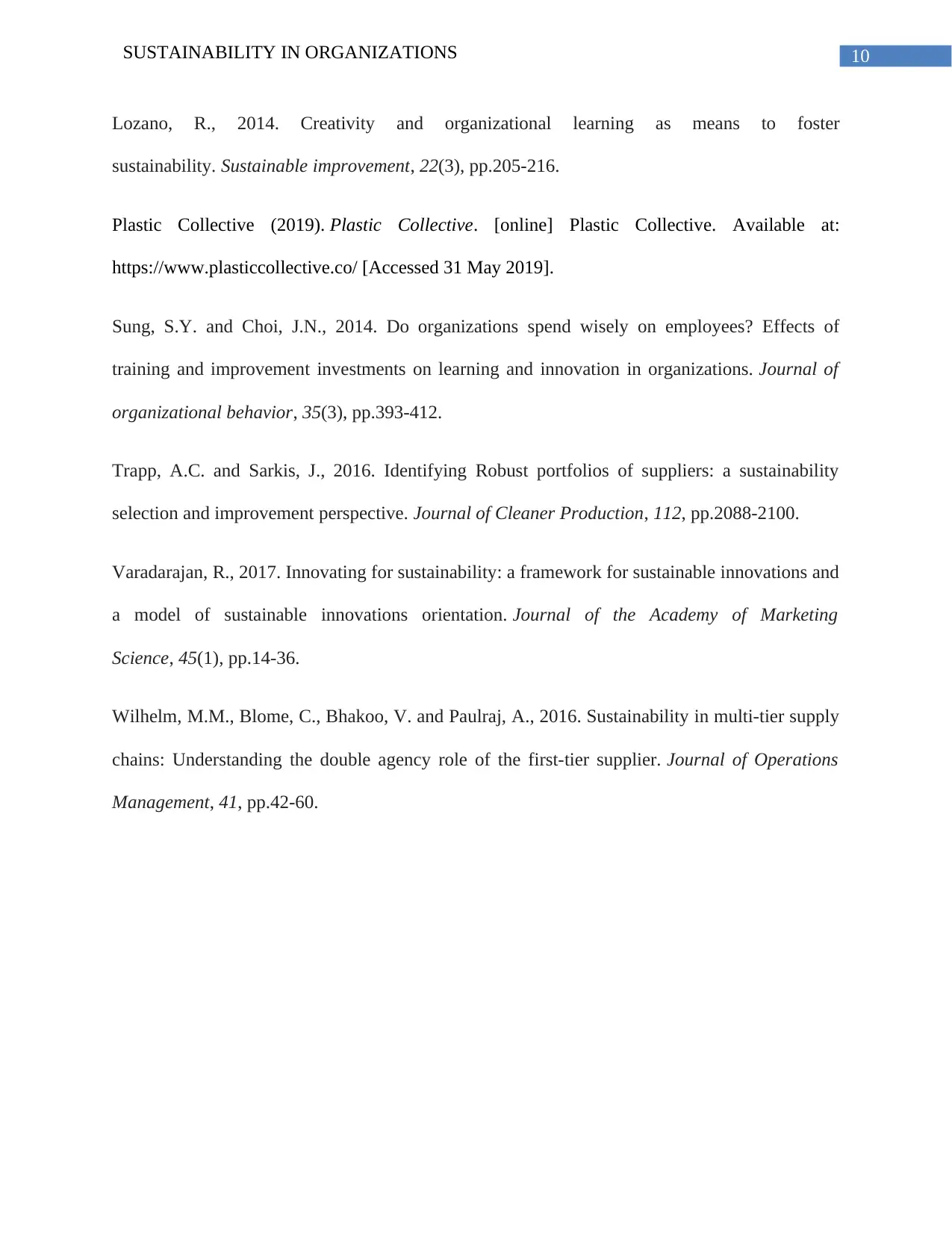
10SUSTAINABILITY IN ORGANIZATIONS
Lozano, R., 2014. Creativity and organizational learning as means to foster
sustainability. Sustainable improvement, 22(3), pp.205-216.
Plastic Collective (2019). Plastic Collective. [online] Plastic Collective. Available at:
https://www.plasticcollective.co/ [Accessed 31 May 2019].
Sung, S.Y. and Choi, J.N., 2014. Do organizations spend wisely on employees? Effects of
training and improvement investments on learning and innovation in organizations. Journal of
organizational behavior, 35(3), pp.393-412.
Trapp, A.C. and Sarkis, J., 2016. Identifying Robust portfolios of suppliers: a sustainability
selection and improvement perspective. Journal of Cleaner Production, 112, pp.2088-2100.
Varadarajan, R., 2017. Innovating for sustainability: a framework for sustainable innovations and
a model of sustainable innovations orientation. Journal of the Academy of Marketing
Science, 45(1), pp.14-36.
Wilhelm, M.M., Blome, C., Bhakoo, V. and Paulraj, A., 2016. Sustainability in multi-tier supply
chains: Understanding the double agency role of the first-tier supplier. Journal of Operations
Management, 41, pp.42-60.
Lozano, R., 2014. Creativity and organizational learning as means to foster
sustainability. Sustainable improvement, 22(3), pp.205-216.
Plastic Collective (2019). Plastic Collective. [online] Plastic Collective. Available at:
https://www.plasticcollective.co/ [Accessed 31 May 2019].
Sung, S.Y. and Choi, J.N., 2014. Do organizations spend wisely on employees? Effects of
training and improvement investments on learning and innovation in organizations. Journal of
organizational behavior, 35(3), pp.393-412.
Trapp, A.C. and Sarkis, J., 2016. Identifying Robust portfolios of suppliers: a sustainability
selection and improvement perspective. Journal of Cleaner Production, 112, pp.2088-2100.
Varadarajan, R., 2017. Innovating for sustainability: a framework for sustainable innovations and
a model of sustainable innovations orientation. Journal of the Academy of Marketing
Science, 45(1), pp.14-36.
Wilhelm, M.M., Blome, C., Bhakoo, V. and Paulraj, A., 2016. Sustainability in multi-tier supply
chains: Understanding the double agency role of the first-tier supplier. Journal of Operations
Management, 41, pp.42-60.
1 out of 11
Related Documents
Your All-in-One AI-Powered Toolkit for Academic Success.
+13062052269
info@desklib.com
Available 24*7 on WhatsApp / Email
![[object Object]](/_next/static/media/star-bottom.7253800d.svg)
Unlock your academic potential
Copyright © 2020–2026 A2Z Services. All Rights Reserved. Developed and managed by ZUCOL.




